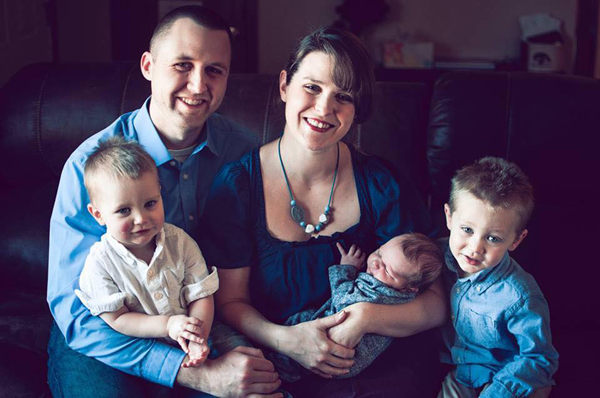
Thomas and Kelsey Steffen, members of St. Wenceslaus Parish in Iowa City, pose for a picture with their sons Francis, Becket and Peter. They have been married since 2012 and recently went through sponsor couple training.
By Lindsay Steele
The Catholic Messenger
The Hopeful House-hold: a series about “the real issues that families are facing and where to find hope in the messiness of life.”
Twenty-five years into their marriage, Bob and LuAnn Glaser were building a home in Burlington. “There was a lot of tension. We were doing a lot of the work ourselves,” recalls Bob, now a deacon at Divine Mercy Parish in Burlington.
They needed a specific telephone for the kitchen and Bob managed to find one at the local hardware store. He brought it home, pleased with the find, but LuAnn’s reaction wasn’t what he expected. “LuAnn said, ‘How much did that set us back?’” He took the phone and stomped out to the garage, grumbling, “Fine, I’ll take it back.” Then there was “some back and forth. Doing all the things we knew we shouldn’t be doing.” An hour later, Bob and LuAnn apologized to each other and talked it out.
Conflicts, big and small, can happen at any stage of marriage. “There are things that happen that a couple disagree on, no matter how many years they’ve been married,” LuAnn said. “You can hurt each other no matter how long you’ve been together.” “It can happen over a stupid thing like a phone,” her husband said.
The Glasers were among three sponsor couples in the Diocese of Davenport who spoke with The Catholic Messenger to share insights on conflict resolution in marriage. Bob and Luann Glaser have been married for 45 years, Deacon John and Cheryl Wagner have been married 35 years, and Thomas and Kelsey Steffen have been married for more than six years.
Listen to each other
The Wagners have been involved with Worldwide Marriage Encounter for the past 30 years. One of the most valuable lessons they have learned is to listen and to not challenge their spouse’s feelings. “You have to accept (your spouse’s) feelings and not judge them as right or wrong,” Cheryl Wagner said. “Let the person talk it out, listen and don’t try to solve (anything). … It’s important not to get mad when you hear what they have to say.”
Couples shouldn’t air a laundry list of complaints. Instead, one partner might say, “I’m feeling this way. Can we discuss it so I can feel better about it?” Cheryl Wagner suggested. It is essential to address feelings before they build up. “If you know there’s an issue, talk about it as soon as you can. Don’t let it percolate.” The Glasers said couples should avoid name calling and using words like always or never. “Focus on what the issue is,” Deacon Bob Glaser said.
The whole family can benefit from learning to communicate feelings in a constructive way. Recently, the Glasers were babysitting their grandson, Booker, whose parents were out of town. He told Grandma LuAnn that he missed his mom. “Instead of saying, ‘It’s okay,’ I just said to him, ‘I know you miss your mom and dad and that’s alright. They’ll be back tomorrow.’ I think we can help our children … to be able to express and work through their feelings.”
Role models
Thomas and Kelsey are parents to three sons under the age of four. Natives of northwest Iowa, they now live in North Liberty and are members of St. Wenceslaus Parish in Iowa City.
The Steffens did not have a sponsor couple as part of their marriage prep in the Sioux City Diocese but were able to look at peer couples who “were able to model what a faithful marriage would look like,” Thomas Steffen said. They found this helpful when they were starting out and learning to adjust to each other’s living habits.
They share a common mindset — love each other to heaven. “It helps us a lot,” Kelsey said. “It’s about helping each other grow in virtue and understanding that sin and vice are human (traits) that we work against.” Thomas added that this mindset helps them to be more merciful with each other.
In Iowa City, they feel blessed to be around other Catholic couples who offer encouragement and inspiration. The joy that radiates from couples living out a Christ-centered marriage “is infectious,” Kelsey Steffen said. The Steffens recently completed sponsor couple training and look forward to mentoring other couples.
A united front
All three couples expressed the importance of having a united front regarding children. If a couple disagrees about how to handle a situation, they should talk about it and come to a consensus so the child isn’t getting mixed messages. Don’t involve the children in arguments.
When Thomas Steffen feels himself getting upset in front of his wife and kids, he will usually go to another room until he is calmer. It’s natural for parents to want to shield their children from disagreements but it is unrealistic for children to grow up believing that their parents never disagree, Deacon John Wagner said.
“Being human, not everyone can do the best thing all the time. Consequently, the next best thing is for parents to demonstrate how they are able to overcome and compensate for their shortcomings and still find ways to live together in peace.”
He said some situations give the opportunity for kids to see parents reconcile, to tell each other they’re sorry and mean it. “These are also powerful lessons.”
It’s not about winning
Cheryl Wagner said conflict resolution isn’t about winning. “It’s about being out in the open with things and discussing them. You might not ever resolve (the problem). Maybe your husband has to work long hours and it’s stressful for you, but he can’t quit. If you can talk about it, you can find things to help you deal with it.”
Compromise might not always be possible. Say you have a certain amount of money to spend and one spouse wants a new couch while the other wants a new lawn mower. Trading off is a good option so that one partner doesn’t feel like they’re giving in all the time, Cheryl Wagner said.
Prayer
A couple that prays together is more likely to stay together, Deacon Bob Glaser said in reference to a Creighton University study on faith and marriage. “The divorce rate for Catholics generally is the same as the rest of the population, about 50 percent. If a couple attends Mass together, it is reduced to about 1 in 30. But if a couple prays together regularly at home it drops it to about 1 in 300.”
Thomas and Kelsey Steffen pray together as a couple, but find praying alone to be useful during a conflict. Thomas Steffen said praying alone during a disagreement helps him to self-reflect. “I’m able to step away from my selfishness and try to look at the whole picture and that helps solve a lot of things.” Kelsey Steffen said they often ask the Holy Family for intercession when they have a disagreement.
The Wagners believes prayer can help couples find answers during a disagreement. Cheryl Wagner recalls an impasse with her husband during a car ride from Davenport to Iowa City. Usually, they would have walked away and cooled down, but being in a car took away that option. “We both prayed, and suddenly something popped into John’s mind, and it was the right thing to say. Sometimes what you need to hear or say comes after the prayer.”
Each night, the Glasers ask each other for forgiveness for anything they may have done, intentionally or unintentionally, throughout the day. Afterward, they pray a few lines from the Act of Adoration and Reparation to Jesus in the Blessed Sacrament to reflect on their relationship with each other and with God. “It’s become part of our routine,” LuAnn Glaser said. Deacon Bob Glaser added, “Some nights are easier than other nights, but it becomes part of your every day practice to forgive each other. That’s what Jesus calls us to do.”











